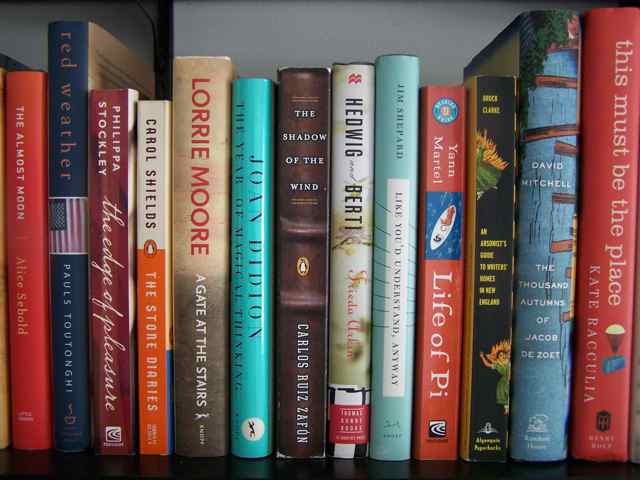 Middle-aged, middle-class, white female readers in my library still rave about The Help, the bestselling novel by Kathryn Stockett, which is now also a hit movie, but back when I read it, it disturbed me how (………….spoiler alert, for anyone still planning to read the book…………) the launching of the young white main character’s writing career seemed to be the big climax. Publishing the black maids’ stories of the racism and discrimination they suffered while working as the household help to white families benefited “Miss Skeeter” much more than the maids themselves. (…end of spoiler…)
Middle-aged, middle-class, white female readers in my library still rave about The Help, the bestselling novel by Kathryn Stockett, which is now also a hit movie, but back when I read it, it disturbed me how (………….spoiler alert, for anyone still planning to read the book…………) the launching of the young white main character’s writing career seemed to be the big climax. Publishing the black maids’ stories of the racism and discrimination they suffered while working as the household help to white families benefited “Miss Skeeter” much more than the maids themselves. (…end of spoiler…)
Novelist Martha Southgate recently wrote an essay on The Help book/movie for Entertainment Weekly that has been getting a lot of comments. The essay skewers the skewed picture that The Help presents of race relations in Mississippi in 1962, lamenting the fact that novels and movies about that time period so often put white characters at the forefront of the civil rights movement instead of in a supporting role. From the essay, The Truth about the Civil Rights Era:
Implicit in The Help and a number of other popular works that deal with the civil rights era is the notion that a white character is somehow crucial or even necessary to tell this particular tale of black liberation. What’s more, to imply that what the maids Aibileen and Minny are working against is simply a refusal on everyone’s part to believe that ”we’re all the same underneath” is to simplify the horrors of Jim Crow to a truly damaging degree.
What are some suggestions for novels on the civil rights movement in addition to, or instead of The Help, that feature African-American main characters? They seem surprisingly hard to find.
I only thought of Like Trees Walking by Ravi Howard, which is set in Mississippi two decades later than The Help, but refers back to civil rights history in the 1960s. There are excellent novels about slavery (e.g. Wench by Dolen Perkins-Valdez) and about other periods of the civil rights movement (e.g. Glorious by Bernice L. McFadden), but searching for novels about Mississippi in the ’60s centering on African-Americans, I found mostly nonfiction.
Searching online for suggestions, I found this Web site that lists titles and quotes reviews of fiction and nonfiction, a mix of adult and children’s titles, dealing with the civil rights era: Bombingham by Anthony Grooms is a possibility, dealing with the Vietnam War from the perspective of a black American male, who reflects on his childhood in the south. The Facebook page for the Callie Crossley Show suggests a mystery series featuring Blanche White, an African-American domestic worker, by Boston-area author Barbara Neely. The series is set in the 1990s, though, so isn’t exactly an alternative for those looking for an historical perspective on that time.
What about trying Freshwater Road, a debut novel by actress Denise Nicholas about a 20-year-old black female college student who travels to Mississippi to take part in Freedom Summer? Or Alice Walker’s Meridian? (Interestingly, Alice Walker posted her opinions on The Help on her blog and just reposted it recently with an update after seeing the movie; I agree with her comments about the novel, including her opinion that listening to the audiobook version of The Help is better than reading the book.)
Finding recommendations for movies to watch instead of The Help is a little easier:
Black and White Struggle with a Rosy Glow (New York Times)
Why Danny Bowes Is Not Going to See The Help
And check out this Web site for reading suggestions for books in all genres from African-American authors:
White Readers Meet Black Authors

I used historian Tim Tyson’s book, “Radio Free Dixie”, in my own research for my book on women and guns — wanting to see when, how and where black women decided to arm themselves during the civil rights era. Daisy Bates, active in desegregation, was one.
I think there’s a double challenge here….women, and black women, are twice silenced when the dominant majority of writers and historians are white and male.
Wow, thank you for all the fantastic links that I’d missed! Looking forward to reading them all now.
Thanks for your comment! I think there are valid points on both sides of the controversy. In many ways, The Help could be one of those books that’s better as a movie!
I’m sorry I didn’t reply to your comment sooner. I agree with you about the double challenge, although it does depend on the author’s willingness to see from another perspective. The Healing by Jonathan Odell (coming out in Feb 2012) has very strong black female main characters even though he’s a white male author. http://bit.ly/nTL2CM